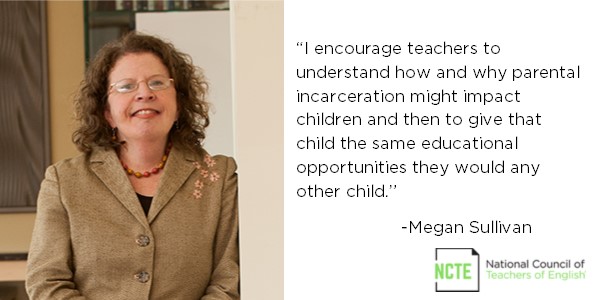This post is written by member Megan Sullivan.
This blog post is about the complex relationship between a parent’s incarceration and a child’s academic success. For me this relationship is personal and scholastic.
I was in fifth grade when my father, a lawyer, received a two-to-five year prison sentence for larceny. Although my family was confronted with the same challenges other families face when a parent is incarcerated (i.e. housing and food insecurity, inadequate heath care, childcare challenges, etc.), we also had considerable privilege. My family was white, and despite our financial ruin we were able to remain in our middle-class community. We roamed safe neighborhoods and attended established schools. My five siblings and I had a great mother, and we had each other. For these reasons it’s easy to see my father’s incarceration in isolation, or as that which did not directly impact my educational opportunities. It would be easy to see it that way, but that would be a mistake and a missed opportunity.
Upon reflection, and as an educator, I can see there are one or two obvious ways my father’s incarceration impacted my siblings and me in school. Those first few weeks and months after my father’s arrest in 1975 were confusing and chaotic. I cannot imagine we performed well academically during this period. My mother, a formerly stay-at-home parent, was immediately thrust into a difficult and low-paying workforce. She had no time to supervise homework or attend parent-teacher conferences. There are also less obvious, less easy to quantify ways we were impacted. My siblings and I were overwhelmed by our new (and lasting) financial difficulty; we were distressed by our father’s absence and our mother’s struggle to provide; and we were burdened by the need to be too responsible too early. Finally, we remained simultaneously grateful to our private Catholic school for offering us free tuition and quieted by this charity.
In 2017 there is still no straight line of evidence between a child’s academic success and a parent’s incarceration, but our research is getting better. We know there are approximately 2.7 million minor children in the United States who currently have a parent in prison or jail. We know these children are at a greater risk for feelings of shame, guilt or anger; that they suffer more from stigma and may have an impaired ability to cope with future stress and trauma; we know they often have poor school performance, but we are just now unpacking why this is the case.
A recent study has found that although maternal incarceration is not initially associated with lower retention rates in elementary school, three years into a mother’s incarceration higher rates of retention creep up. Another study found detrimental effects on cognitive outcomes for middle school boys and girls who had incarcerated parents but suggested this may be because of socioemotional problems that affect cognitive skill acquisition. Finally, there is a fair amount of literature that finds school-aged children are impacted by teacher and peer stigma when a parent is incarcerated.
So what is a teacher to do? Parental incarceration in considered an adverse childhood experience, or as an experience – like trauma, abuse, or parental divorce – that can impact a child long after an event occurs. For this reason in my writing and in my professional development work with schools, I encourage teachers to understand how and why parental incarceration might impact children and then to give that child the same educational opportunities they would any other child. In order to remind teachers of what they can do, I encourage them to ABC Teach Students.
Acknowledge there may be students in your classroom that may have parents in prison. Given that 2.7 million minor children currently have a parent in prison, you are likely to have some of these children in your classrooms and schools. Be mindful of this possibility.
Books can be lifesavers – include at least one or two books in your classroom or school library that speak to the reality of parental incarceration. I just wrote Clarissa’s Disappointment to help students. My book is a middle grade reader focusing on a young girl who deals with various emotions when her father returns home from prison. The book also contains resources for teachers and schools. In Clarissa’s Disappointment Clarissa must contend not only with her own feelings, but also with the fact that she is stigmatized by her classmates. You can find other book titles here.
Conference creatively – both in your writing conferences with students and when it comes to parent-teacher conferences, think creatively. When students in your Language Arts classes are writing persuasive letters and you know a child in your classroom has an incarcerated parent, ask if he or she would like to mail his/her letter to the parent. Some schools have arranged video conferences between classroom teachers and parents in prison. Be creative about how parents and children might communicate.
Teach Students – In social studies classes or on International Children’s Rights Day broaden classroom discussions of children’s rights. San Francisco Partnership for Children of Incarcerated Parents created a Bill of Rights for Children of Incarcerated Parents. Ask students to talk about why a separate bill of rights for children of incarcerated parents might be necessary.
This memory trick, ABC Teach Students, is meant to remind teachers that there are things they can and should learn about children of incarcerated parents, but after that, they should just teach them – just like they would all students.
Megan Sullivan is Associate Dean for Faculty Research and Development and Director of the Center for Interdisciplinary Teaching & Learning at Boston University’s College of General Studies. Her most recent books include Parental Incarceration: Personal Accounts and Developmental Impact and Clarissa’s Disappointment And Resources for Families, Teachers and Counselors of Children with Incarcerated Parents.

